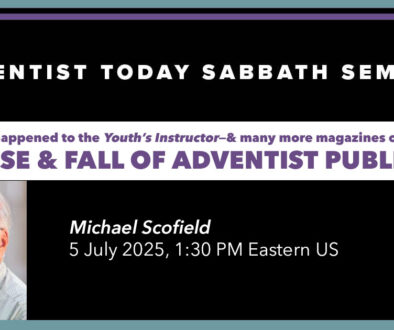Aunty, what about people with sexual sins in the church?
16 May 2022 |
Dear Aunt Sevvy:
I just recently read Aunt Sevvy’s response to a person who had issues with having a drug addict attending church with them.
I have a related question. How should the church handle a person addicted to pornography, masturbation, or illicit sex? The church manual lists these as issues for church discipline, and the methods provided in the manual are censure or church removal. Given that addictions may take long, if not a lifetime, to resolve, how do we deal with such issues?
Signed, Concerned about Secret Sins
Dear Concerned,
 Compulsive sexual behavior is a complex question. Which is why Aunty reached out to counselor David Evans-Carlson (MA in Counseling Psychology, Registered Clinical Counselor with the British Columbia Association of Clinical Counsellors) to address it.
Compulsive sexual behavior is a complex question. Which is why Aunty reached out to counselor David Evans-Carlson (MA in Counseling Psychology, Registered Clinical Counselor with the British Columbia Association of Clinical Counsellors) to address it.
David writes:
Churches often have a culture of shame and silence around sexuality in general (healthy or unhealthy), which means they don’t offer good direction for people whose sexual compulsions have become problematic.
We can trace a lot of this back to shame. Shame says that there is something inherently wrong with a person—the sin paradigm. Someone struggling with compulsive behavior that is hurting them or their relationships typically will hide and avoid being seen out of self-preservation. For most people, compulsive behavior comes from a desire to avoid feeling difficult or painful emotions such as disappointment, loneliness, grief, anger, loss, etc. Calling people out about things in which they already feel like failures only exacerbates the problem, and fuels further compulsion.
It’s been my experience that people only grow in environments where they feel safe, seen, loved and respected. Only then they can risk being vulnerable. Practicing feeling all of the feelings and moving away from avoidance leads people to live less compulsively.
The secrecy and shame around sexuality also perpetuates unrealistic expectations around sexuality in general. For example, masturbation is a safe and healthy expression of sexuality, and yet it is still mentioned as if it were inherently wrong. The church holds up a false ideal that a person’s sexuality emerges on their wedding night and leads to wedded sexual bliss.
This is not the case for most. Some Christians use pornography alone or in their romantic relationships. This cannot be talked about, because exploring ways this may or may not be negatively impacting them would be to reveal a “sin.”
The church also creates false equivalences of “sexual sin.” There is often little or no distinction between consensual sexual acts (unmarried sex, masturbation, homosexual relationships) and non-consensual sexual crimes and assaults (rape, molestation, sexual harassment, pastoral sexual abuse).
It would be healing for the church to move toward acceptance regarding sexuality. First, we need to understand that the promoted “purity culture” continues to hurt and shame very normal and healthy people. Many Christians who followed purity culture face devastating realities in their married sexual experiences due to ongoing feelings of sexual shame and unrealistic expectations.
And if we really want people to be honest about the ways they are compulsively avoiding their pain, we need to be safe, nonjudgmental friends who will listen and care. Accusing others when we see them struggling is easy, but ultimately damaging.
When it comes to relating to compulsive sexuality, most churches are not prepared to provide support and care. In most cases, working with a licensed therapist is the safest and most effective way to help those who are being negatively impacted by their compulsions.
But it would be nice if the church could try to be a place of felt safety to help people feel less alone and more loved.
Thank you, David Carlson!
Aunt Sevvy
 You can write to Aunt Sevvy at DearAuntSevvy@gmail.com. Please keep questions or comments short. What you send us at this address won’t necessarily be, but could be, published—without identification of the writer. Aunt Sevvy writes her own column, and her opinions are not necessarily those of Adventist Today’s editors.
You can write to Aunt Sevvy at DearAuntSevvy@gmail.com. Please keep questions or comments short. What you send us at this address won’t necessarily be, but could be, published—without identification of the writer. Aunt Sevvy writes her own column, and her opinions are not necessarily those of Adventist Today’s editors.
To join this conversation, click/tap here.




